External links
- Liberia Past and Present mentioning the killing of Tolbert by Pennoh. Archived 2011-03-15 at the Wayback Machine
Harrison Pennoh is best known for allegedly killing then-President of Liberia William Tolbert on 12 April 1980.
In 1979, hundreds of protesters marched through the streets of Liberia's capital, Monrovia, demonstrating against the sharp rise in the price of rice. Tolbert ordered his troops to fire on the demonstrators, and approximately seventy people were killed. Despite efforts to restore order, rioting ensued throughout Liberia, and attempts to quash the opposition by arresting its leaders failed. On 12 April 1980, Tolbert was overthrown by military mutineers in a coup d'état where the 66-year-old President was savagely murdered by private soldier Harrison Pennoh, who later proved mentally unstable. Before the end of the month, Tolbert's entire Cabinet had been put on trial and sentenced to death — with no right to be defended by a lawyer and no right to appeal to the verdict. All but one were publicly executed on a beach near Monrovia. The only cabinet members who escaped from being shot were the only minister of tribal origin, raised in an Americo-Liberian family that was part of the Tolbert-clan Ellen Johnson Sirleaf and the Minister of National Security Burleigh Holder, who was imprisoned at the notorious Belle Yalla prison in Lofa County.

Samuel Kanyon Doe was a Liberian politician who served as the 21st President of Liberia from 1986 to 1990. He ruled Liberia as Chairman of the People's Redemption Council (PRC) from 1980 to 1986 and then as president from 1986 to 1990.

The president of the Republic of Liberia is the head of state and government of Liberia. The president serves as the leader of the executive branch and as commander-in-chief of the Armed Forces of Liberia.
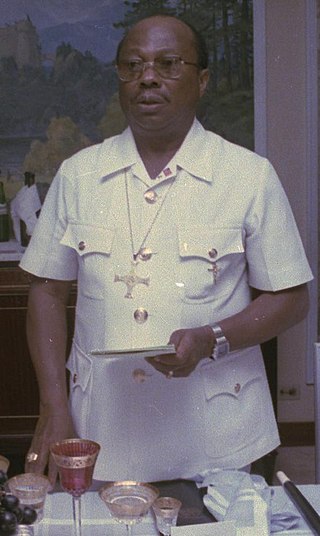
William Richard Tolbert Jr. was a Liberian politician who served as the 20th president of Liberia from 1971 until his assassination in 1980.

Monrovia is the capital and largest city of Liberia. Founded in 1822, it is located on Cape Mesurado on the Atlantic coast and as of the 2022 census had 1,761,032 residents, home to 33.5% of Liberia’s total population. Its Metro Area including Montserrado and Margibi counties largely being urbanized, was home to 2,225,911 inhabitants as of the 2022 census. As the nation's primate city, Monrovia is the country's economic, financial and cultural center; its economy is primarily centered on its harbor and its role as the seat of Liberian government.
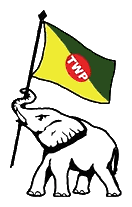
The True Whig Party (TWP), also known as the Liberian Whig Party (LWP), is the oldest political party in Liberia and one of the oldest parties in Africa. Founded in 1869 by primarily darker-skinned Americo-Liberians in rural areas, its historic rival was the Republican Party. Following the decline of the latter, it dominated Liberian politics from 1878 until 1980. The nation was virtually governed as a one-party state under the TWP, although opposition parties were never outlawed.

George Henry Andrews was a Liberian sports journalist and later minister of Tourism and Cultural Affairs of Liberia. He presided over a pivotal election in the 1990s.
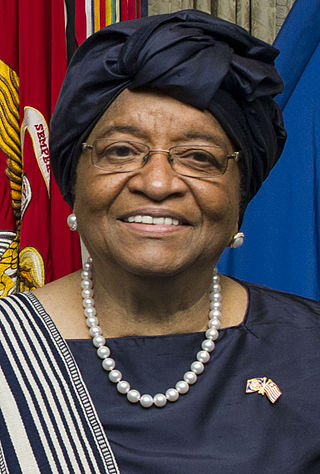
Ellen Eugenia Johnson Sirleaf is a Liberian politician who served as the 24th president of Liberia from 2006 to 2018. Johnson Sirleaf was the first elected female head of state in Africa.

Charles Cecil Dennis Jr was a Liberian political figure who served as Minister of Foreign Affairs under President William Tolbert from 1973 until the 1980 Liberian coup d'état led by Samuel Doe. Along with 11 other current and former members of the Liberian government, he was tried by a military tribunal and executed by firing squad ten days after the coup.
Lafayette K. Morgan, former economic advisor of the Republic of Liberia, was an accomplished accountant and financial expert.
The Ministry of National Defense is the government ministry responsible for the maintenance of the national defense and the governance of the military of Liberia, the Armed Forces of Liberia.
The Progressive Alliance of Liberia (PAL) was an opposition political movement formed in 1975 in Liberia led by group of Liberians from the United States and local students. The Political Education Team of the organization was organized, prepared, and awarded certificates by and under the signature of the founding Chairman of PAL, Gabriel Baccus Matthews. Members of the Political Education Team of six young Liberian students were:
Dr. Edward Binyah Kesselly (1937-1993) was a minister in the Cabinet of William R. Tolbert, Jr. in Liberia. During the late 1970s, he headed the Ministry of Posts and Telecommunications; President Tolbert appointed him to the ministry on February 3, 1978. His predecessor as head of Posts and Telecommunications, J. Jenkins Peel, had resigned that office to become the Minister of Information, Cultural Affairs and Tourism, in which Kesselly had previously served as an administrator for five years. One of the few members of Tolbert's cabinet to survive the military coup d'état that overthrew Tolbert's government in 1980, he founded the Unity Party in 1984. Buried in Monrovia after his 1993 death, he was re-buried eighteen years later at his hometown of Nyama-Kamadu in Quardu Gboni District of Lofa County. Among the speakers at the pomp-filled reburial ceremony were Bureau of Maritime Authority Commissioner Edward Binyah Kesselly, Jr., his eldest son, and Unity Party standard bearer Ellen Johnson Sirleaf, the President of Liberia.
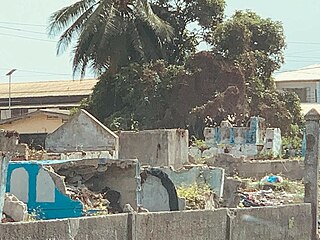
Palm Grove Cemetery is a cemetery near downtown Monrovia, the capital city of Liberia. During the Tolbert administration, the cemetery became the focus of the national Decoration Day, which continued to be observed after Tolbert was murdered in a 1980 coup d'état and his body dumped at the cemetery. Once the country's national cemetery, it was threatened during June 1982 by Monrovia municipal authorities. In a complaint to the People's Redemption Council, the city noted that the cemetery was being used as a waste dump and was so full of graves that new burials were being conducted unsafely, even though increasing numbers of local residents were being buried in Paynesville. The authorities requested permission to close the cemetery to new burials and to move the cemetery to a new location, away from its original Center Street site, but the cemetery remains in Monrovia to date.

The 1980 Liberian coup d'état happened on April 12, 1980, when President William Tolbert was overthrown and murdered in a violent coup. The coup was staged by an indigenous Liberian faction of the Armed Forces of Liberia (AFL) under the command of Master Sergeant Samuel Doe. Following a period of transition, Doe ruled Liberia throughout the 1980s until his murder in 1990 during the First Liberian Civil War.
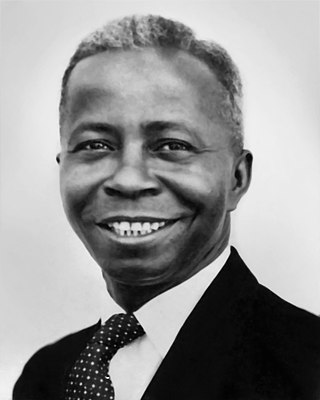
Edison Reginald Townsend was a Liberian journalist and statesman known for the establishment of Liberia's Information Services. He served as Secretary of Information and Cultural Affairs under President William Tubman, and as Minister of State for Presidential Affairs under President William Tolbert. In 1979 he was elected National Chairman of the True Whig Party. Following the 1980 Liberian coup d'état of President Tolbert on April 12, 1980, he and several other members of the Tolbert administration were put on trial and without due process executed by firing squad on April 22, 1980.

Americo-Liberian people, are a Liberian ethnic group of African American, Afro-Caribbean, and liberated African origin. Americo-Liberians trace their ancestry to free-born and formerly enslaved African Americans who emigrated in the 19th century to become the founders of the state of Liberia. They identified themselves as Americo-Liberians.

The Maryland ritual killings were a series of ritualistic murders that occurred around Harper, Maryland County, Liberia in the 1970s. The crimes have been regarded as "Liberia's most notorious ritual killing case" due to the number of murders, the involvement of high ranking government officials and their subsequent public executions.
Edith Mai Padmore, nee Wiles was a Liberian politician. She became Liberia's first female cabinet minister when she was appointed Minister of Health and Welfare in 1972.

Israel-Liberia relations refer to the bilateral relations between the State of Israel and the Republic of Liberia. Liberia was one of the United Nations member states to vote in favor of establishing a Jewish state in Palestine in 1947. Israel and Liberia established relations in the late 1950s. The administration of William Tolbert severed ties with the Israeli government in 1973 in response to the Yom Kippur War, but they were re-established in 1983 by Samuel Doe, who succeeded Tolbert via coup.
Events in the year 1980 in Liberia.